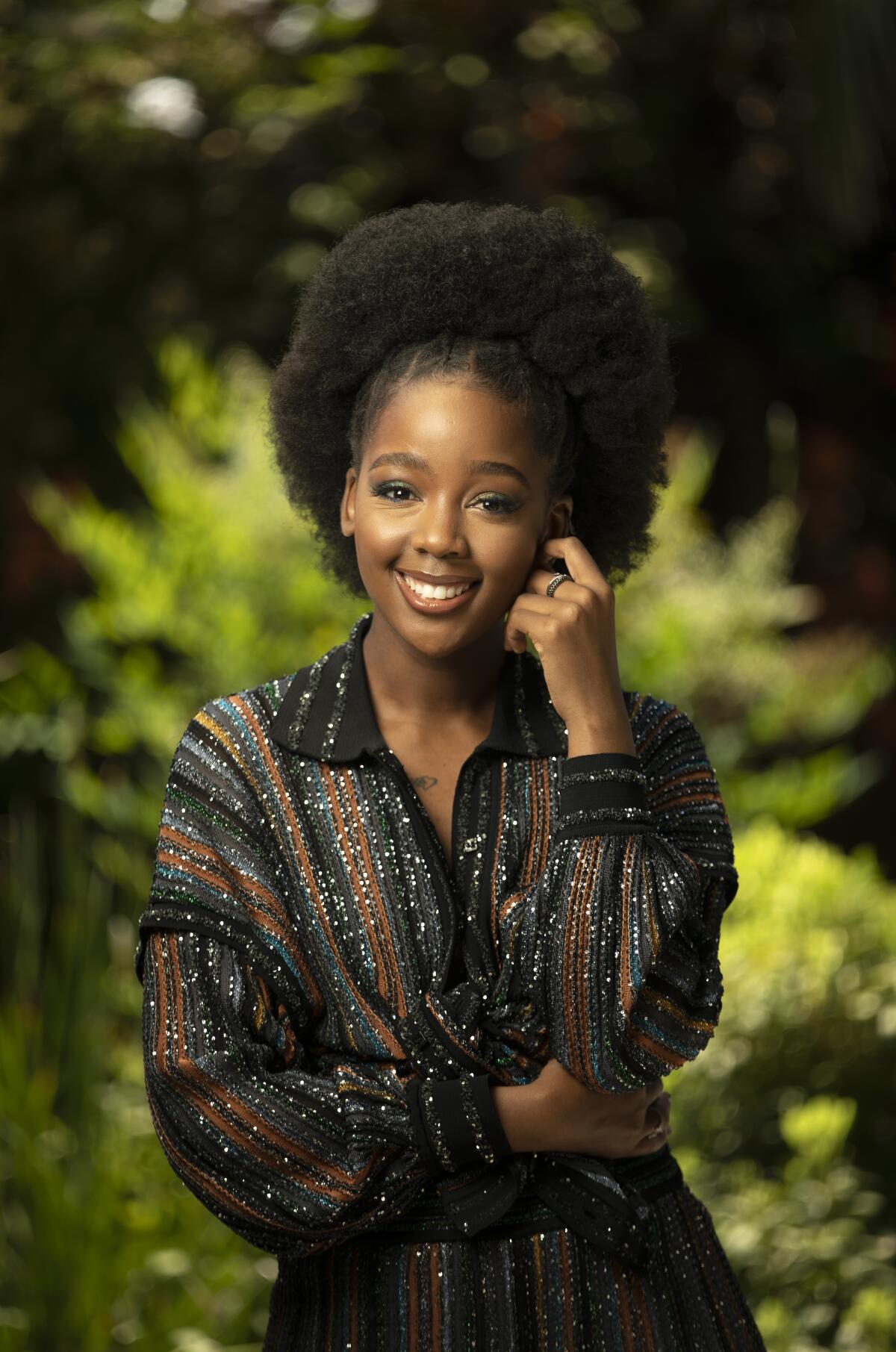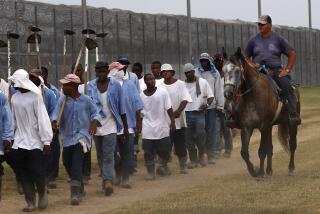Thuso Mbedu plays out the horrors of history in ‘Underground Railroad’

- Share via
Taciturn runaway slave Cora Randall barely speaks a word in the transcendent final 17 minutes of “The Underground Railroad,” but make no mistake: Thuso Mbedu, who stars as Cora in Barry Jenkins’ 10-episode limited series, couldn’t be more loquacious when she’s off-script. During a recent Zoom interview from her Los Angeles home, the 29-year-old actress spoke nonstop for five minutes about the challenges of embodying a traumatized Black woman who makes her way from a Georgia plantation through the Carolinas and Tennessee to the North. “What I thought I knew about slavery in America was nothing compared to the truth, which was heartbreaking,” she says.
Beloved in her native South Africa for playing scrappy teenager Winnie in “Is’Thunzi,” Mbedu had already earned two International Emmy nominations and accumulated 1.3 million followers on Instagram by the time she taped her “Railroad” audition in New York City. Casting director Francine Maisler shared the tape with Jenkins. “I immediately saw that Thuso had this ability to emote with her face, her shoulders, her posture,” the writer-director said in a recent press conference. “The actress playing Cora needed that ability, and Thuso was clearly capable of doing this.”
Mbedu prepared for the role by poring over the Pulitzer Prize-winning Colson Whitehead novel the series adapts and immersing herself in the history of American slavery. “The most important thing in my research was hearing these testimonials from former slaves speaking this broken English,” Mbedu says. It’s the type of thing you would hear if you went to rural areas in South Africa today. “I could hear my people in these testimonials, and that really connected me to this world. Instead of being an African American story, it became for me an African-in-America story.”
Before the 116-day production began filming in Georgia, Mbedu worked with dialect coach Kristina Reiersgard to emulate the slurred cadences of her character. “Coming from this plantation full of pain and suffering, Cora’s been ostracized by the community because her mother abandoned her,” Mbedu says. “Cora hardly ever speaks out loud. What does that voice sound like? It must convey an inner turmoil, an inner chaos, because she’s fighting the ghost of her mother.”
Like Cora, Mbedu grew up without a mother, who died of a brain tumor when Mbedu was just 4. Raised by her grandmother, who died in 2014, Mbedu says she refrained from excavating her personal history to animate Cora’s back story.
“I tried to do that once on a project, and my brain literally shut down and went, ‘No, no, no.’ It was too painful,” says Mbedu. “I can empathize, and I can sympathize, and I can improvise and understand these emotions, because I’ve lived through it. However, as a coping mechanism, my body doesn’t allow me to tap into the raw emotion of what I’ve experienced.”
Still, Cora’s harrowing “Railroad” odyssey required Mbedu to dig deep during sequences driven almost entirely by body language and nonverbal utterances. When Cora tries to escape bounty hunter Ridgeway (Joel Edgerton), Mbedu notes, “You hear these guttural grunts because Cora’s pain, her confusion, her desperation is carried in her breath.
“At university I studied voice movement therapy where we explore how trauma is held in different parts of our body, and how that affects us vocally and psychologically,” says Mbedu, who shifted career paths from dermatology to theater while attending the University of the Witwatersrand in Johannesburg. “That’s very important to me when it comes to creating a character. It’s not just about playing the role physically; you’re telling the story vocally.”
When Ridgeway catches Cora and shackles her to the body of a recently dead runaway slave stored in the flatbed of his wagon, Cora responds by kicking, screaming, whimpering, squealing, moaning and weeping with a depth of intensity rarely presented on the small screen. How did she prepare for, and recover from, that particular sequence?
“I don’t even know how to explain it,” Mbedu says. “We knew we were creating this horrific tableau, but I knew I could go as far as I wanted, because there were people who were there to catch me, physically and emotionally.”

To help Mbedu and other cast members deal with the show’s graphic portrayals of antebellum cruelty, Jenkins hired on-set therapist Kim White. Her services became essential after filmmakers depicted a massacre of Black churchgoers at the hands of their white neighbors.
Mbedu recalls, “The pain, the chaos, the confusion with everything that was happening in the context of the massacre — snapping out of that when they called ‘Cut’ was very hard, to the point where I had to go the counselor and say, ‘Help me come back. Help me find myself because I’m not really sure where I am right now.’”
In “Railroad’”s final chapters, Cora, escorted by the free-born Royal (William Jackson Harper) makes it to Indiana. There she joins the “Valentine’s Farm” community of Black farmers. “When Cora sees these Black bodies with agency who are creating their own destinies, it seems too good to be true. So at first, she’s very skeptical,” Mbedu says.
Later, Cora learns to enjoy her freedom. “People on set seemed much lighter during this beautiful moment when Barry told me, as Thuso, ‘Smile! Because it feels like you’ve been holding your breath for such a long time.’ Cora, smiling, allows the audience to breathe, but it takes a real journey before we get to that point.”
More to Read
From the Oscars to the Emmys.
Get the Envelope newsletter for exclusive awards season coverage, behind-the-scenes stories from the Envelope podcast and columnist Glenn Whipp’s must-read analysis.
You may occasionally receive promotional content from the Los Angeles Times.










